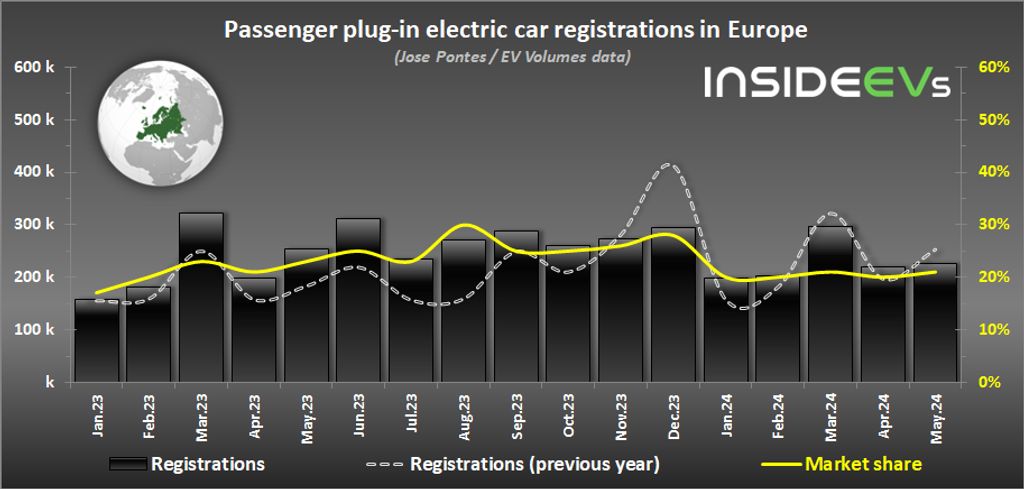In May, plug-in electric car sales in Europe decreased by 10% year over year, which is not a good sign, especially since the overall market noted only a 3% drop.
According to EV Volumes data, shared by researcher Jose Pontes, 226,178 new plug-in electric cars were registered in Europe in May. The market share amounted to roughly 21% (compared to 23% a year ago).
A flat year in progress
After the first five months of the year, it seems that 2024 will be a flat year in Europe. Plug-in electric sales are only slightly higher than in the same period in 2023.
All-electric car registrations account for about 14% of the market (roughly 150,000 units), while plug-in hybrid registrations account for about 7% of the market. Both types noted a similar year-over-year sales decrease.
Interestingly, non-rechargeable hybrid registrations increased by 15%, capturing 30% of the market. All types of electrified vehicles (EVs, PHEVs and HEVs) had 51% of the market.
Another interesting thing is that nearly one in five all-electric cars sold in Europe were manufactured in China, prompting the European Union to launch special tariffs on China-made EVs.
Plug-in car registrations for the month (YOY change):
- BEVs: about *150,000 (down 11%) and 14% market share
- PHEVs: about *75,000 (down 10%) and 7% market share
- Total: 226,178 (down 10%) and 21% market share
* Estimated from the market share
Over 1.1 million passenger plug-in electric cars were registered in Europe during the five four months of the year. That’s barely 2% more than a year earlier. The market share remains stable at about 21%.
Plug-in car registrations in January-May (YOY change):
- BEVs: about *0.76 million and 13% market share
- PHEVs: about *0.38 million and 8% market share
- Total: 1,148,085 (up 2%) and 21% market share
* Estimated from the market share
For reference, over 3 million passenger plug-in electric cars were registered in Europe in 2023, 16% more than in 2022. The market share amounted to 24% (compared to 23% in 2022, 19% in 2021, and 11% in 2020).

The Tesla Model Y remains Europe’s best-selling plug-in model, with 11,236 new registrations in May, but Tesla was down as a whole by 35% year-over-year. Not only that, the Volvo EX30 was not far behind with 8,262 units.
The Tesla Model 3 happened to be third, followed by four MEB-based models from the Volkswagen Group: Audi Q4 e-tron, Volkswagen ID.4, Volkswagen ID.3 and Skoda Enyaq iV.
Results for the month:
- Tesla Model Y – 11,236
- Volvo EX30 – 8,262
- Tesla Model 3 – 7,865
- Audi Q4 e-tron – 6,708
- Volkswagen ID.4 – 5,936
- Volkswagen ID.3 – 5,683
- Skoda Enyaq iV – 5,339
- Volvo XC60 PHEV – 5,287
- MG 4 – 5,135
- BMW iX1 – 4,741
After the first five months of the year, the top three models are Tesla Model Y, Tesla Model 3 and Volvo EX30.
Results in January-May 2024:
- Tesla Model Y – 78,861
- Tesla Model 3 – 39,574
- Volvo EX30 – 30,171
- Audi Q4 e-tron – 28,119
- Volvo XC60 PHEV – 24,549
- Skoda Enyaq iV – 23,481
- MG 4 – 22,768
- Volvo XC40 – 22,639 (21,326 BEVs + 1,313 PHEVs)
- Peugeot e-208 – 21,511
- Volkswagen ID.4 – 21,117
Tesla was the most popular brand in the plug-in car segment during the first five months of the year, but the differences between the top four brands are relatively small.
In terms of automotive groups, Volkswagen Group, with a 20% share, is the lone leader. Stellantis (13.2%) is second, followed by three companies close to each other: BMW Group, Geely-Volvo and Tesla.
Top brands by share in the plug-in segment in January-May:
- Tesla – 10.5%
- BMW – 10.3%
- Mercedes-Benz – 9.0%
- Volvo – 8.8%
- Audi – 6.7%
- Volkswagen – 6.2%
Top automotive groups by share in the plug-in segment in January-May:
- Volkswagen Group – 20.1%
- Stellantis – 11.7%
- BMW Group – 10.9%
- Geely-Volvo – 10.7%
- Tesla – 10.5%
- Mercedes-Benz Group – 9.5%
- Hyundai Motor Group – 8.1%
- Renault-Nissan-Mitsubishi Alliance – 5%
Read the full article here



